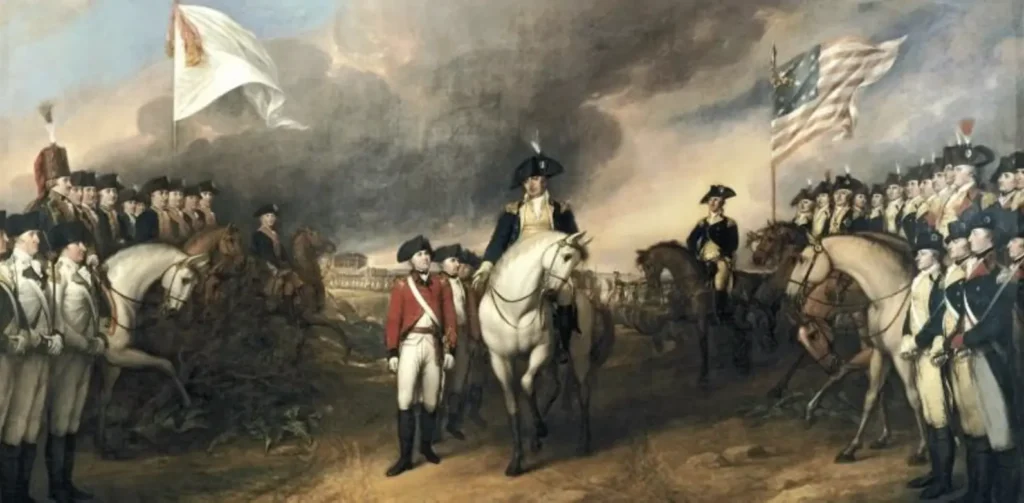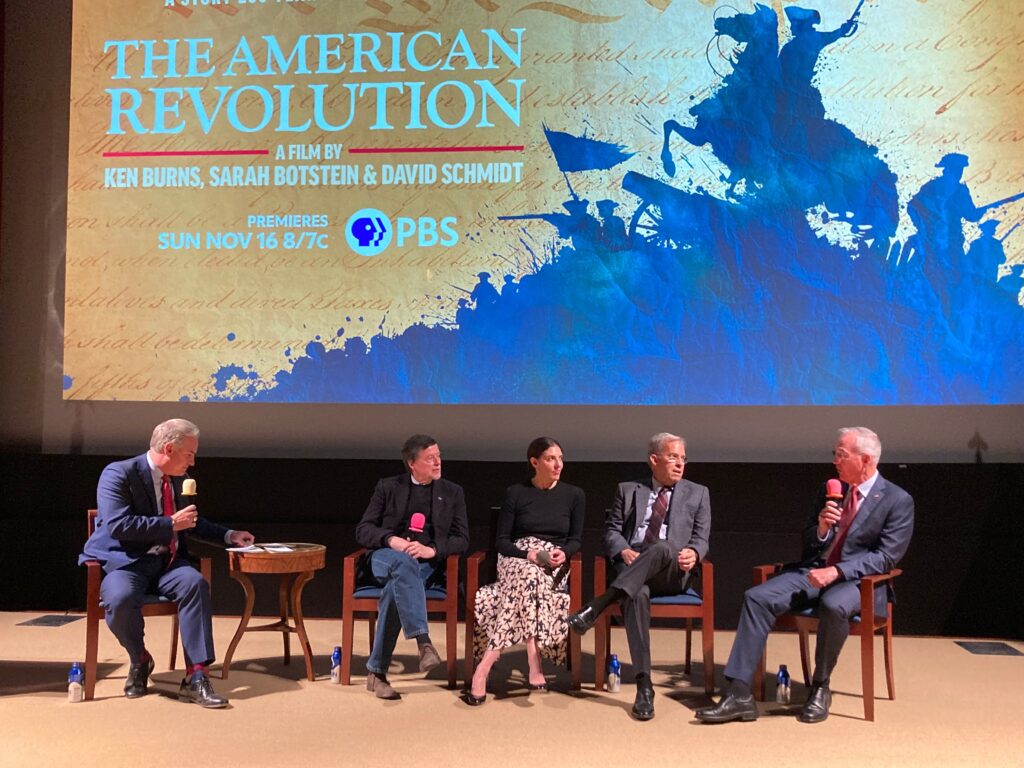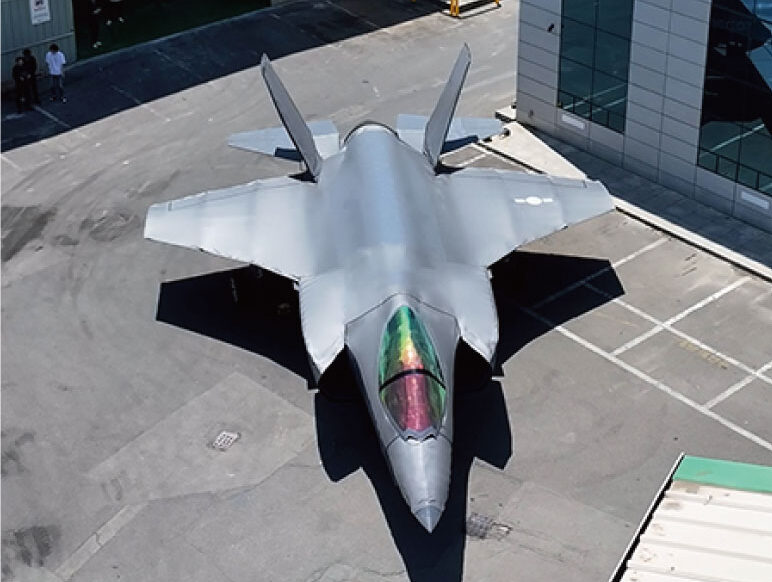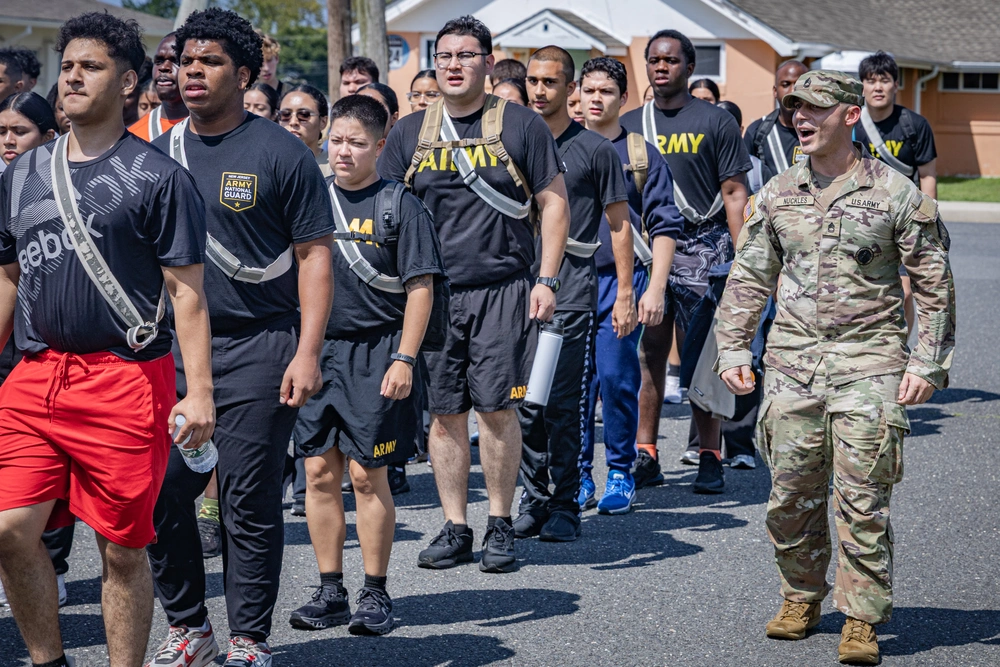Ken Burns’ new documentary focuses on George Washington as genius military talent scout and motivator
- By Hope Seck
Share This Article

A clip from the upcoming The American Revolution documentary by celebrated director Ken Burns tells of a brewing crisis by candlelight: men at the Continental Army’s winter encampment in Newburgh, NY in 1783 were ready to foment revolt over bad living conditions and delayed paychecks.
Into a room of grumblers walked General George Washington, who strode to a lectern to make the case for his Army’s continued service. As he turned to read a letter to the soldiers from a Virginia congressman, he faltered and reached for a pair of spectacles.
“Gentlemen, you must pardon me,” Washington is recorded to have said. “I have grown gray in your service and now find myself growing blind.”
As the documentary’s narrator intones, the rest of the letter became irrelevant at that point.
“Many officers, hard men made harder still by battle, were openly weeping,” the narrator says. “The mutiny was over before it could begin.”
In Burns’s six-part, 12-hour documentary, which premieres November 16, just ahead of the nation’s 250th anniversary, Washington the general and the statesman is unabashedly the main character.
At a panel discussion October 29 at Mount Vernon, Virginia – Washington’s beloved estate – Burns suggested that Americans don’t fully grasp how essential the man was to the success of our fledgling nation.
“We don’t have a country without [Washington], period, full stop,” Burns “When we say the word indispensable, we know what that means, but we don’t really know what it means. If he had been captured or killed in this war, this experiment would not have happened, or would not have happened in any way, shape, or form similar.”
The panel – which included co-director Sarah Botstein, military historian Rick Atkinson, and retired Marine General Joseph Dunford, 19th chairman of the Joint Chiefs of Staff – described Washington, as he emerged from the series, as an imperfect military leader who made costly tactical errors in his youth and even early in the Revolutionary War. But they also highlighted his genius for inspiring and motivating his fighting forces, and his uncanny knack for spotting raw military talent in unlikely places.
“Washington at Cambridge, [Massachusetts], in ’75, sees this overweight, 25-year-old Boston bookseller named Henry Knox, and intuits he’s going to be the father of American artillery,” Atkinson, who’s midway through publishing his own trilogy of books on the Revolution, said. “The same week, he sees a lapsed Quaker in his mid-30s named Nathanael Greene, and somehow intuits that he’s going to be more indispensable than anybody else, other than Washington himself.”
Knox would become Washington’s chief of artillery for the duration of the revolution and later succeed him as senior officer of the Army; Greene would prove brilliant as Washington’s quartermaster general, rescuing a fragile supply system and distinguishing himself in battle.
Equally impressive was Washington’s ability to convince young people to follow him and fight in a model substantially different from what had been seen before in England.
Related: Ye olde tomahawk – From the Revolution to the GWOT

“That’s a hard thing, to persuade a 19- or 20-year-old kid sometimes that there is something larger than himself. But Washington was particularly good at it, and he got better at it as the war went on,” Atkinson said.
“There are so many other things that originate with him … including an enormous amount of correspondence that he writes right from the beginning to state governors, to Congress, to local committees of safety, the subtext of which, throughout the next eight years is, ‘I am your servant. I affirm civilian control of the military. Neither I nor the army I command is a threat to the Republic that you aspire to build. I will not be [Oliver] Cromwell. That’s an amazing thing that he did at the time, and it’s an amazing thing that he has given us. It’s why no serving or past Soldier, Sailor, Airman, or Marine, would ever begin to think of a coup,” he added.
Dunford, now the chairman of the board of the Adams Presidential Center, said Washington also embraced an apolitical military – a concept that has come up for review for some in recent times as President Donald Trump has encouraged partisanship in addresses to troops – but one that he said had been a source of stability and security for the United States.
“Every one of our founding fathers, [including] George Washington, was concerned about the existence of a standing army in the threat that that army may turn on the American people,” he said. “And the single biggest mitigator of that risk is this idea of non-partisanship and civilian control of the military. That’s how important what George Washington did in our Revolution is to today.”
For Burns, the miracle of the American Revolution is summed up in the words of a German military captain, Johann Ewald, who marveled at the Americans’ ability to unite around a common cause.
“And he says, ‘Who would have thought 100 years ago that out of this multitude of rabble would arise a people who could defy kings?’ That’s, to me, the whole essence of the project: To defy kings.”
The American Revolution premieres for free streaming November 16 at 8p.m. Eastern on PBS.org.
Read more from Sandboxx News
- F-22 Raptor will become the first American jet to fly alongside drone wingmen
- Mark 9 SDV: The SEALs’ mini-sub that packed full-sized torpedoes
- How Charles Lindbergh helped American pilots fight the Japanese in WWII
- FN’s MTL-30 wins the Army’s Precision Grenadier contest for a next-gen grenade launcher
- Can older candidates make it through special operations selection?
Related Posts
Sandboxx News Merch
-

F-35 ‘Evolution’ Poster
$22.00 – $28.00Price range: $22.00 through $28.00 Select options This product has multiple variants. The options may be chosen on the product page -

A-10 ‘Thunderbolt Power’ Framed Poster
$45.00 – $111.00Price range: $45.00 through $111.00 Select options This product has multiple variants. The options may be chosen on the product page
Hope Seck
Hope Hodge Seck is an award-winning investigative and enterprise reporter who has been covering military issues since 2009. She is the former managing editor for Military.com.
Related to: Military History, Pop Culture

Viral video shows Korean company’s lifelike inflatable F-35 decoy

Which service did best in the military recruiting boom? The numbers are in
Sandboxx News
-

‘Sandboxx News’ Trucker Cap
$27.00 Select options This product has multiple variants. The options may be chosen on the product page -

‘AirPower’ Classic Hoodie
$46.00 – $48.00Price range: $46.00 through $48.00 Select options This product has multiple variants. The options may be chosen on the product page -

‘AirPower’ Golf Rope Hat
$31.00 Select options This product has multiple variants. The options may be chosen on the product page -

‘Sandboxx News’ Dad Hat
$27.00 Select options This product has multiple variants. The options may be chosen on the product page
